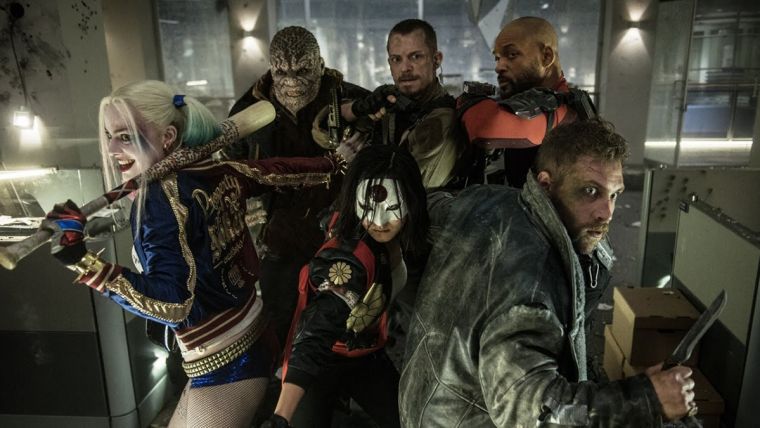
They say you should never judge a book by its cover, and that’s probably doubly true within the Christian subculture. There’s also a modern cinematic version of that old adage: never judge a movie by the Internet hype – and that holds whether it’s positive or negative.
Suicide Squad, the latest instalment in the fledgling DC Comics Cinematic Universe, has received an absolute pasting in its first few days of release. At time of writing it has an average rating of just 27 per cent on Rotten Tomatoes, and such has been the furious outpouring of hatred against the film, writer/director David Ayer has been forced to come out and publicly defend it.
So it’s safe to say that since the hot anticipation that had surrounded the film has now entirely dissipated, filmgoers who now find themselves in possession of a ticket to Ayer’s ‘super-anti-hero’ flick will be going in with their expectations safely lowered. And perhaps, like me, they’ll therefore be very surprised at what they find.
In case you’ve evaded both hyperbole and hatred, the plot is fairly simple. With Superman now unavailable, and the usual apocalyptic villainous threat laying waste to yet another American city, the mysterious government suits decide to employ a crack team of super-villains to take on the even greater evil. They include the screen-dominating Harley Quinn (Margot Robbie) and hitman Deadshot (Will Smith), and are corralled by Joel Kinnaman’s law-abiding Captain Flag, who just happens to have planted co-operation-assuring mini-bombs in their necks. Somewhat reluctantly, Flag and his team descend into their probably-suicidal mission, and super-hero filmy stuff ensues.
The fascinating anti-hype that has preceded the film’s general release is, in my opinion at least, a bit baffling. Much of it has been directed at Jared Leto, who has committed the cardinal sin of not being Heath Ledger while playing the Joker (I thought he was ok), and Smith, whose bad guy apparently isn’t bad enough – although for a man who alternately wears a cross and a misquote of Jesus, maybe that’s the point. Fans have been divided, but critics have been savage. It’s almost as if they never gave the film a chance.
Suicide Squad isn’t a masterpiece; it doesn’t even come close to some of the stellar heights of the genre, hit by Marvel’s recent Captain America: Civil War. But here’s the big news: it really isn’t terrible. In fact, there are some very good reasons to recommend it. Robbie, Smith and Kinsman all give decent performances, bettered by the wonderfully monstrous Viola Davis as the government agent behind the whole scheme. Many of the characters are pretty well drawn, with believable back stories that you actually start to care about, and there are subplots involving a couple of other DC comic characters which will pique fan interest.
But beyond that, the supposed plotless mess described by some of those early reviewers simply never materialises. The story is fairly generic when you get past the high-concept of the ‘squad’ themselves, but it’s no worse than that seen is many other action films. The gun-toting bits get a bit grating, but that’s a symptom of a tiring genre, not a reason for particular disgust for this film.
Also by Martin Saunders
- Star Trek Beyond: searching for hope in a godless universe
- Don’t be afraid – Ghostbusters is a triumph for feminists and fans alike
- Gods of Egypt: a brilliantly terrible film about theology and the afterlife
- X-Men Apocalypse: prodigals at the end of the world
- Our Kind of Traitor: A lesson in radical integrity
It’s also refreshingly not dominated by white men – there are strong women and well developed non-white characters which make the Marvel films look tokenistic in comparison. There’s a counter-argument that it’s concerning that a film about levels of evil has been stuffed full of ethnically-diverse actors, but since the film gives most of them an opportunity to behave heroically, I’m not sure that holds.
Most interesting of all though is what the film has to say about the concept of evil. While it’s clearly not going to be universally loved, Suicide Squad is still one of the most important and influential presentations of worldview to hit culture in 2016, and its central thesis is that some evil is worse than other evil; that violence can be redemptive; that two wrongs can make a right. I think it’s fascinating that the film asserts this idea – rebuked by parents through the ages – so forcefully. While there’s some talk of redemption and hope, really the film seems to believe that serial killers are somehow less bad than genocidal monsters, and that if one vanquishes the other, somehow society wins. In the context of the upcoming US elections and various other current world events, it’s perhaps a metaphor in desperate search of deconstruction.
The best scenes in Suicide Squad all take place when the gunfire stops. In one, near the end of the movie, the assembled bad-but-not-so-bad guys sit in a bar and discuss their evil deeds. Again there’s talk of hierarchy; of one sin being worse than another. In the midst of all the misery they cause, it’s clear that none of them can find any peace, a conversation that belies the central theme of the movie: hate wins, but not really.
You might not care for this sort of thing anyway; the violence and bad language flow pretty freely throughout. But don’t judge Suicide Squad on the basis of those early reviews; many fans will probably love it. And for all of us, it provides a salutary reminder not to allow the other people’s opinions to dominate and coerce our own, especially where the Internet is concerned.
Martin Saunders is a Contributing Editor for Christian Today and the Deputy CEO of Youthscape. Follow him on Twitter @martinsaunders.


